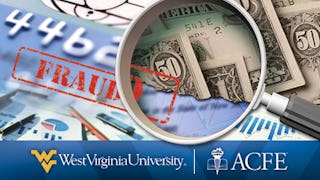This course equips learners with the analytical skills and practical frameworks necessary to identify, prevent, and respond to corporate fraud across organizational settings. Structured into two key modules, the course begins by introducing foundational fraud concepts, including motivational drivers, the Fraud Triangle, real-world fraud cases (e.g., Enron, Worldcom), and preventive regulatory frameworks such as the Sarbanes-Oxley Act. Participants will identify fraud indicators, explain regulatory standards, and demonstrate understanding of internal control mechanisms.



Corporate Fraud: Detect, Prevent & Implement Controls

Instructor: EDUCBA
Access provided by Project Access International
What you'll learn
Identify fraud drivers, regulatory standards, and internal control mechanisms.
Apply financial and forensic analysis to detect fraud indicators and red flags.
Formulate structured responses, reporting, and anti-fraud workplace strategies.
Skills you'll gain
Details to know

Add to your LinkedIn profile
7 assignments
August 2025
See how employees at top companies are mastering in-demand skills

There are 2 modules in this course
This module introduces learners to the foundational concepts of corporate fraud, including its causes, real-world examples, regulatory frameworks, and the internal controls used to prevent and detect fraudulent activities. Learners will explore the psychological and organizational factors that contribute to fraud, examine landmark corporate fraud cases such as Enron and Worldcom, and understand the evolution of laws like the Sarbanes-Oxley Act. Additionally, the module equips learners with practical insights into preventive strategies and detection tools, ensuring a robust understanding of fraud control mechanisms in a corporate environment.
What's included
9 videos4 assignments
This module focuses on advanced analytical tools and strategies used to detect and respond to corporate fraud. Learners will explore the application of financial statement analysis, including vertical and horizontal approaches, and various ratio analysis techniques to identify inconsistencies and red flags in financial reports. The module also introduces forensic accounting methods and the role of data analytics in uncovering fraud. Lastly, it guides learners through structured organizational responses to fraud incidents, including investigation protocols, internal communication, and post-fraud action planning to reinforce control environments.
What's included
7 videos3 assignments
Why people choose Coursera for their career




Explore more from Business

West Virginia University

Coursera



